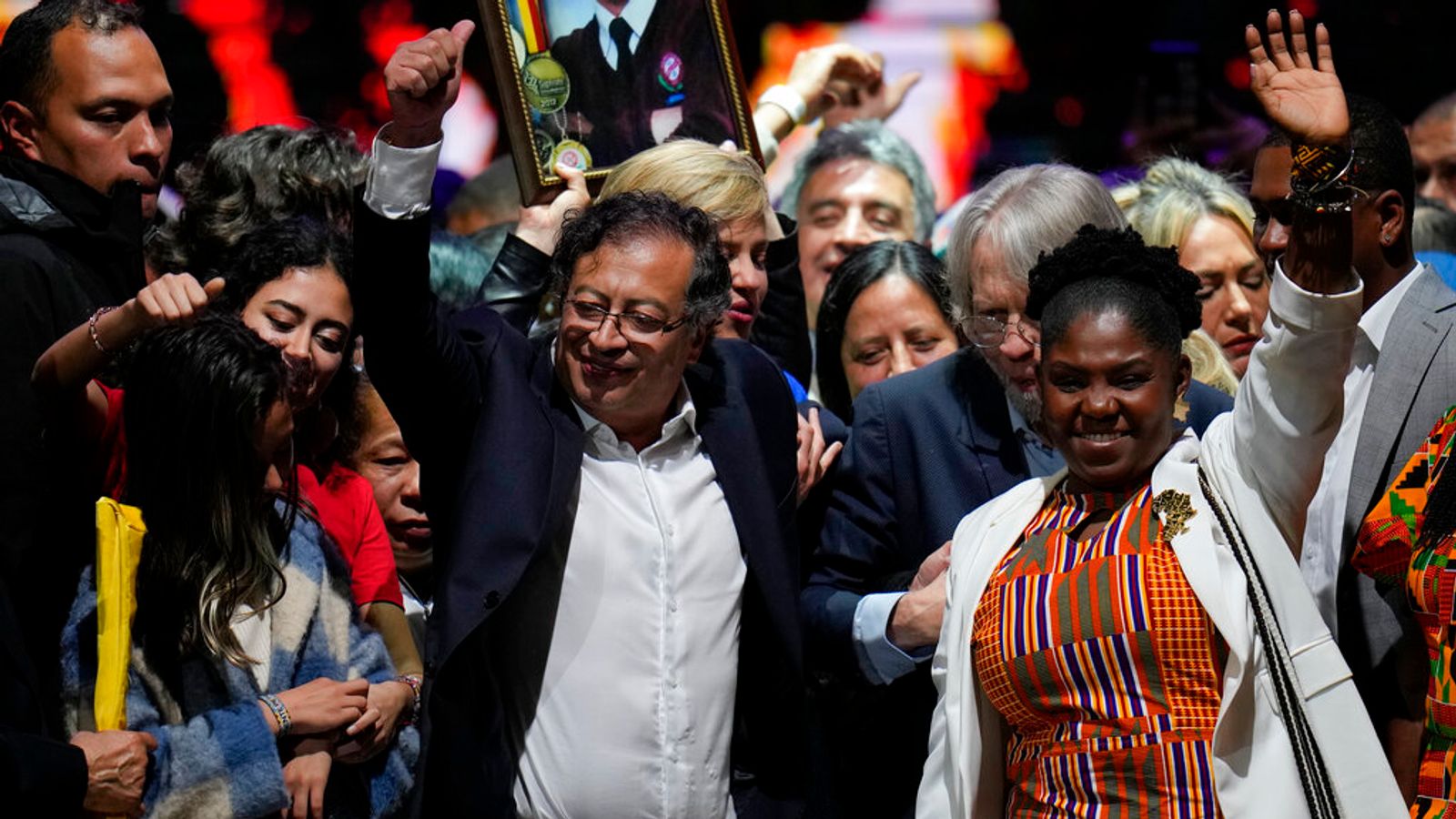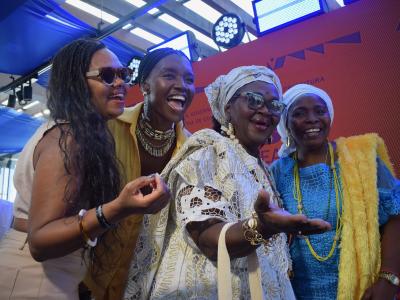It could be said that the demobilization of The M-19 [Movimiento 19 de Abril] in 1990 was one of the few success stories in Colombia's trouble dhistory, albeit in a context of deep political violence, thanks to a process of dialogue with the president, Virgilio Barco. Unlike other guerrillas, such as the FARC and ELN, the M-19 decided to participate unambiguously in democratic institutions. In fact, members of the M-19 participated in the drafting of the 1991 Constitution, and one of its former commanders, Antonio Navarro Wolff, was co-president of the National Constituent Assembly.
This peace process is perceived as one of the most successful in Colombian recent history because many of the then leaders of the M-19 have since been part of the political system, reaching positions of the highest level. Nevertheless, their top leader a presidential candidate, Carlos Pizarro, was assassinated during the party's campaign of 1990, when two more candidates were killed.
The new President Gustavo Petro is a product of this demobilization, carrying the baton of ideals, despite having witnessed the murder of his mentors. Once back in civil life, Petro steadily gained visibility in the Colombian political scenario as a fierce opponent of the policies of the former right-wing president, Álvaro Uribe.
Petro was elected for the first time to the Chamber of Representatives in 1991 and continued his successful political rise as Senator (2006-2010 and 2018-2022) and Mayor of Bogotá (2012-2015). Petro had unsuccessfully run for president in 2010 and 2018.
Francia Márquez, on the other side, gained national visibility in 2018 when she was awarded The Goldman Environmental Prize. Márquez has been building her political capital as a representative of the communities that have historically been invisible to the political elite and the country's institutions.
His no. 2, the first Afro-descendant elected vice president, Márquez comes from La Toma, in the department of Cauca, an area that has been deeply affected by political violence fuelled by drug trafficking. Márquez has suffered such violence, and during her tenure as an environmental activist, she was repeatedly threatened by different illegal armed groups.
Despite not belonging to any of the traditional structures of Colombian politics, her electoral performance was a great surprise because she managed to be the runner-up in the primaries of the Historical Pact, with about 780,000 votes, thus catapulting her vice-presidential candidacy.
“Los Nadies” Take Power
Much of the success of the Petro-Márquez duo consisted in building a powerful coalition of social movements, sectors from the political left and center, as well as questioned alliances with traditional politicians, who managed to establish points of agreement to propose an agenda of economic change and democratic inclusion.
These proposals were put into the public debate as a form of rupture with the government of unpopular president Iván Duque, who was unable to establish bridges of communication with a citizenry dissatisfied with the structural inequalities of the country, aggravated by the ravages resulting from the Covid-19 pandemic.
Amid this scenario of citizen effervescence, Petro and Márquez proved to be the candidates capable of representing those demands. Márquez embodied the voices of those she called "los nadies" following a famous poem by the Uruguayan writer Eduardo Galeano, that is, the victims of the conflict, women, territories, communities, and minorities who, as mentioned above, have been systematically forgotten by the Colombian State and have experienced first-hand the violence of the armed conflict in the absence of greater interest from the political and economic elite concentrated in the central Andean zone.
For these "nadies", Márquez elaborated a speech that focused on the offer of economic changes and political recognition to achieve the minimum conditions of a dignified life and full guarantee of rights. This promise was installed in the minds of their voters through the slogan "vivir sabroso," which embodies the way of life of the Afro-descendant communities of the Colombian Pacific.
Recent interviews published by the Colombian news portal, La Silla Vacía, show the hopes and challenges that the voters of the Petro-Márquez duo have placed on the incoming government. There, people of different ages, ethnic groups, and geographical origins were interviewed with the common bond of having voted for the Petro-Márquez candidacy. These people represent the Colombian citizenry that struggles every day to survive in the midst of unfavorable economic conditions. One of them is Zaida Díaz, a 36-year-old security guard, who, despite being qualified as a Health, Safety, and Environment manager, has been in an unsuccessful search for a job where she can apply her studies.
For Zaida, the incoming presidency is an opportunity to achieve prosperity by “the nobodies, the suffering, those who have fought." This is also the case of Valentina Córdoba, a university student, who is originally from a rural area near Quibdó, the capital city of the Chocó department, one of the most impoverished areas of the country, with one of the largest Afro-descendant populations and partially controlled by illegal armed groups. According to Valentina, "when something happens here, nobody notices, nobody cares, nobody knows what happens. We are those nobodies, we live what no one else lives." For this reason, Valentina says, she was moved by the choice of Márquez, because she believes that, given her personal history, Márquez will be able to understand the needs of her community.
The Periphery Speaks Up
The vote distribution of the elections reflected the discourse elaborated by Petro and Márquez around political and economic inclusion. The electoral map shows that those departments where they triumphed over their opponents are precisely the "peripheral" territories, that is, those where there is the less institutional presence of the State, where violence has been felt most strongly, and where the benefits of the country's continued economic growth have been seen less.

In departments with deep symbolic meaning due to their ethnic diversity and the intensity that the armed conflict has acquired, as is the case of the department of Cauca, Márquez's place of origin, the winning duo attained a share of votes of 79.02%.
In Chocó, with a large Afro-descendant presence, they obtained 81.94%.
In La Guajira, one of the poorest departments in the country, located in the extreme north of the country, they obtained 64.56%.
In addition to the above, they electorally conquered the capital, Bogotá, with 58.59% of the total valid votes, where Petro had already been mayor and where alternative sectors have predominated electorally in recent times.
The Hernández-Castillo duo triumphed in historically wealthy central departments associated with conservative sectors, as is the case of the imposing Antioquia; in addition to border areas with Venezuela and the department of origin of Hernández, Santander.
The challenge: unity for reconciliation and change
One of the great challenges that the new administration will face will be to build bridges with political sectors from other ideological spectrums in order to advance the set of reforms needed to foster progress. Building trust and reconciliation will then be fundamental to fulfilling the electorate’s eagerness for visible and immediate changes. The challenge is not minor. Added to the years of polarization and political violence, videos were leaked in which it was evidenced that the Petro-Márquez campaign systematically disseminated fake news about their political opponents. A phrase of one of their top advisers has already become famous in Colombia, who in a recorded meeting stated that the ethical line should "move a little" to achieve victory.
However, for now, the elected president has given positive signs aimed at reconciliation and the construction of a respectful and democratic debate with the opposition. Petro has not only moderated many of his most radical proposals but has built bridges with his former political rivals, including former President Álvaro Uribe, with whom he recently held a meeting, thus paving the way for the construction, at last, of a democracy in which dissent does not become a reason for the exercise of violence. Reaching basic agreements with different political sectors to implement a progressive agenda is then one of the most immediate challenges that the country's next head of state must face.















